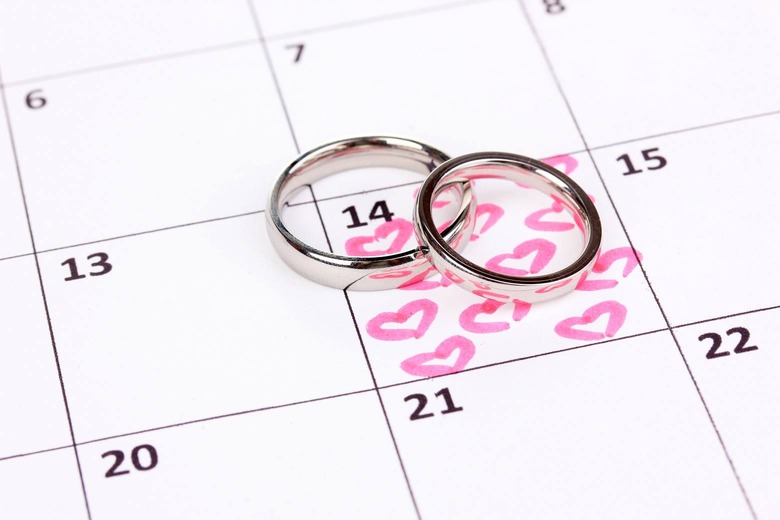5 Tips For Setting The Perfect Wedding Date
If you're newly engaged, one of the first steps to planning your nuptials is picking out the perfect wedding date. From budget to weather to the convenience of your guests to your favorite seasonal flowers and times of year, there is a lot to consider when it comes to choosing when to tie the knot. It's not just as easy as finding a venue you like and picking a random Saturday that they happen to have free.
We've boiled picking a wedding date down to five easy-to-follow steps. So, if you're in need of a little guidance, break out your calendar and check out these tips below:
Consider What's Most Important
Did you start dating on September 13 and want to honor that date with another 13? Is fall your all-time favorite season? Are you totally in love with a certain venue that only operates in the warm weather months? Think about what is the most important for you and your fiancé when it comes to your wedding. Whether it's a particular anniversary, time of year, or event, this day is all about you two, so pick something that is special.
Picture Your Wedding
Once you start pinning and looking at ideas for your wedding, an image of your event is likely to come to you pretty quickly. If you imagine peonies, which are only in season for a short window in the late spring, a date in May is in order. If you imagine bold colors against a snowy backdrop, booking a date in January or February may be your style. If you want to get married outdoors, consider pleasant late spring or early fall months for your wedding. Whatever the theme or vibe for your wedding is, a time of year will naturally follow for it.
Know Dates to Avoid
If members of your family are sports fanatics, Super Bowl weekend, college bowl weekends, the World Series, and the Final Four are times when you definitely shouldn't book your nuptials. Weekends surrounding holidays, such as Easter, Mother's Day, Father's Day, Fourth of July, Thanksgiving, Christmas, and New Year's Eve are big no-no's for weddings as well, because many people have established traditions and plans for those days. And though the dates may be more convenient for Jewish weddings (which often take place on Sundays to avoid the Sabbath), booking your wedding over a three-day weekend may cause a headache for your guests who already have plans or those who want to avoid high travel costs. (An exception might be destination weddings; in this case, your guests might welcome the chance to travel over a period when they'll have a few days off anyway.)
Take Your Guests Into Consideration
Every wedding has guests who are a little more important than others, so factor in your family members, bridal party, and close friends when picking a date. Is your father an accountant who's swamped at work in March and April? Is your best friend a teacher who's only available during the summer months? Do you have elderly family members who may be unable to travel during the winter? Think of your "wedding VIPS" and ask them what dates may or may not work for your nuptials before booking a venue.
Think of Your Budget
Certain times of the year are more expensive to get married in than others, so if budget is a concern, considering getting hitched during the off-season. The most expensive months are generally June through October, when venues, florists, cake bakers, DJs, and photographers book up quickly and cost more. Saturdays are also the most popular (and thus expensive) day of the week to tie the knot. If you're really looking to save big bucks, consider getting married on a Thursday, Friday, or Sunday.
